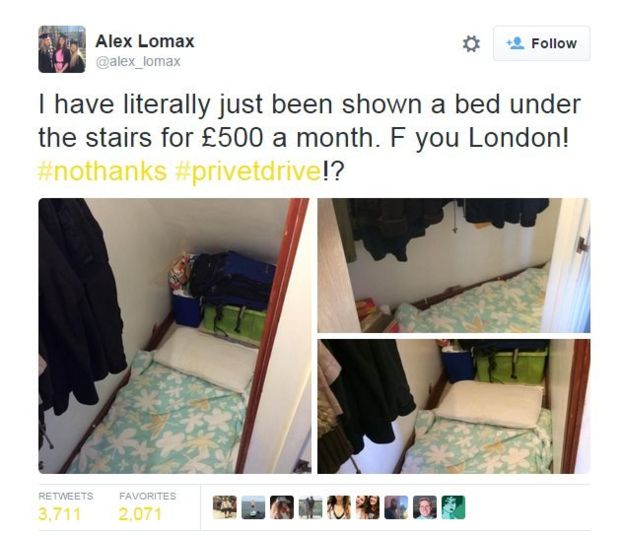Every day, a new scandal emerges about the state of Britain’s rental market, with rip-off landlords charging eye-watering levels for shoddy accommodation. We publish here three short pieces that give an insight into the horrific conditions and parasitic behaviour promoted by rentier capitalists and speculators.
Every day, a new scandal emerges about the state of Britain’s rental market, with rip-off landlords charging eye-watering levels for shoddy accommodation. We publish here three short pieces that give an insight into the horrific conditions and parasitic behaviour promoted by rentier capitalists and speculators.
The cost of renting from private landlords has been steadily rising across the UK for years. In February of this year, Sajid Javid, Conservative communities secretary, admitted that the average house price in the UK was now at 7.5 times the average annual income, making home ownership a distant dream for most people. What’s more, rents in many parts of the country are now more than half of the average take-home pay, with London and the South-East as particular problem areas for unaffordable rents.
Increasingly, people who have jobs are being forced to claim housing and other benefits in order to afford the cost of renting – thanks to rising costs, shorter and unreliable working hours, and terrible pay. Yet despite the fact that more and more people are forced to claim benefits to top-up sub-standard wages, a recent BBC investigation found that out of around a sample of 11,000 online listings for spare rooms, all except a few hundred stated that benefit claimants were not welcome.
With a rental market like this, on top of underemployment and austerity cuts, it’s no wonder that more and more people are unable to afford a place to live. The number of young adults aged 20 to 34 forced to remain living with their parents rose by almost half a million in the UK from 2008 to 2015. More shocking still, homelessness in the UK in 2016 was double what it was in 2010.
Paying more for less
Not only has the cost of renting a home been getting higher and higher, but the quality of private rental properties has been getting worse and worse. People are expected to live in cramped, inadequate housing, often in unsafe conditions – often for extortionate prices. Statistics released in 2015 showed that the number of people aged between 45 and 55 living in flat or house shares due to unaffordable homes had risen by 300% since 2010. There are so few affordable properties that people are increasingly living in overcrowded house shares, well beyond their student years.
A collection of rental adverts for properties in London gained notoriety on the internet when they were collated on a well-known news blog; the collection included a room that could quite literally only just fit a single mattress in for £700 a month, and a room that was evidently a small kitchen with a single bed in it for £870 a month. The situation is particularly bad for students. A survey conducted by the NUS in 2014 found that over half of student properties for rental had condensation, mould or damp problems, and a quarter had vermin infestations, ranging from slugs to mice.
Supply and demand
At the beginning of 2017, the Royal Institute of Chartered Surveyors (Rics) – the body responsible for accrediting landlords, property developers, and others in the property industry – conducted a survey in the UK of rental properties and found that rents are likely to rise by a further 25% in the next few years. Rics said a huge part of the problem was the lack of new listings. The survey also predicted landlords would further scale back their portfolios in the next 12 months – meaning tenants having even fewer properties to choose from – further pushing up rental prices.
The number of home completions in England has been lower than any other country in Europe – relative to its population size – for the last thirty years. The construction sector was hit particularly badly in the 2008 financial crash, when output dropped faster than in any other sector of the UK economy. Ever since then, with wages low and people unable to afford housing, there’s no real incentive for the investors to start building again. A chief executive for a large UK construction consultancy firm said in March 2017 that “building new homes to meet the government’s targets for solving the housing crisis are already significantly behind”, and the instability in the markets that Brexit produced has done nothing to alleviate this issue.
As the population increases generation on generation, the demand for new and affordable housing also rises. But nobody is building! The idea that supply will always move to match demand, under capitalism, is clearly completely false. There is a colossal demand for decent quality, affordable housing; but with capitalism in a stagnant period, where people’s wages are low and employment unstable, investing in building such housing is not profitable to the individual capitalist – no matter how useful it might actually be to all of us.
The need for a planned economy
When the economy is based around individual profit and competition, rather than co-operative and collective gain, supply and demand will only meet when there is profit to be made for the individual capitalist. Ultimately, this is bad for the economy in the long run. If decent, affordable houses were to be built, it would create jobs in the construction sector, reduce the need for people to rely on housing benefits, and provide a better quality of life for millions currently living in substandard housing. Unfortunately, that’s not how capitalism works: it would take a democratically planned economy, based on collective need rather than individual profit, for such a thing to happen.
The only way to solve the housing crisis is to take the housing industry into public democratic ownership, and to plan the building of houses to genuinely meet demand. No to rentier capitalists and speculators, no to the interests of private capitalists coming before the interests of the people!
By John Russell, Norwich Marxists
Intro image by Images Money, CC by 2.0
Racist landlord bans “coloured people” because of “curry smell”!
 By Edward Stokes
By Edward Stokes
Super-landlord Fergus Wilson has added a new entry to his list of people who cannot rent his properties: “No coloured people.” His reason: “because of the curry smell.”
Many people would think that such flagrant discrimination would not be possible today but Fergus Wilson has suffered no legal repercussions and has taken no hit to his vast wealth for making such disgraceful remarks, all of which has been widely reported. Yet still thousands of families have their fates at his fingertips; the decision on whether or not they are allowed to have a home resting on one man’s fickle, racist whims. Wilson continues to sit on over £100 million pounds of properties, mainly in the south of England.
Indeed, it seems that Walsh is an equal-opportunities bigot. According to a report in The Guardian newspaper: ‘The landlord is said to have barred domestic violence victims from renting his homes… He is also said to have blocked plumbers, single parents, workers on low income or zero-hours contracts, families with children, pet owners, smokers and single adults.’
This indicates a return to the worst elements of Rachmanism, which blighted the rental market in the post-war years. Then it was common for signs to be posted outside rooms for rent saying, “No Blacks or Irish.” Slum landlords like Rachman used the situation to rent rooms that were little more than high-priced hovels and sent thugs round to deal with anyone who complained.
Today, nothing has changed. According to a report by Shelter in 2014, ‘200,000 people faced eviction in the past year for complaining about conditions in their homes, while one in 12 renters were too scared to ask for repairs in case they were turfed out.’
People like Walsh and the others think they can get away with anything. The Tories talk about “reviewing” the rental market but in truth they are hand-in-glove with these profiteers and have no interest in doing anything that will upset them. The exposing of modern-day Rachmans like Wilson is long overdue. The solution is to nationalise rental accommodation and make the properties available at an affordable rent with proper maintenance and upkeep. Empty housing stock should also be taken over for public use rather than let them lie empty. Rotten landlords like Wilson feed off housing shortages, tackle this and you tackle them. A socialist programme for housing is the way forward.
The scandal of rabbit hutch homes
 By Woody Phillips-Smith, Warwick Marxists
By Woody Phillips-Smith, Warwick Marxists
As the philosopher Theodor Adorno lamented long ago in regard to American culture, “what the philosophers once knew as life” has become a mere “appendage of the process of material production”. For evidence of this, you need look no further than some of the recent “affordable accommodation” projects now being built.
Recent relaxations in government regulations have allowed housing developers to push down the size of new-builds and conversions. The old space requirement laws limited any new dwelling to no less than 37 sq metres minimum of floor area, yet recent research by the Royal Institute of British Architects has found that many new developments fall below this standard by as much as 10 sq metres. One particularly shocking example of this has come to light., Flats in the planned office conversion of Barnet House in London will it seems measure just 16 sq metres at their smallest, 40% less space than that of the average Travelodge hotel room for instance. What’s next? Living in coffins?
Developers unfailingly appeal for justification for this cost cutting to the critical housing shortage, necessitating focus on rapidity of development and quantity over quality. What they don’t mention is the extortionate rents (averaging £800 per month in Barnet) extracted by their owners, who thrive on the housing insecurity of tenants, especially those struggling to find a place to live in cities such as London.
We should directly confront these profiteering developers with their glaring concentration of wealth under capitalism and their sole focus on maximising profit at our expense. This is the root cause for both the widespread homelessness we encounter daily and the meagre alternative of homes that are not much bigger than boxes – only when housing is in the hands of the working class will it reflect the need for space in which to truly live.






